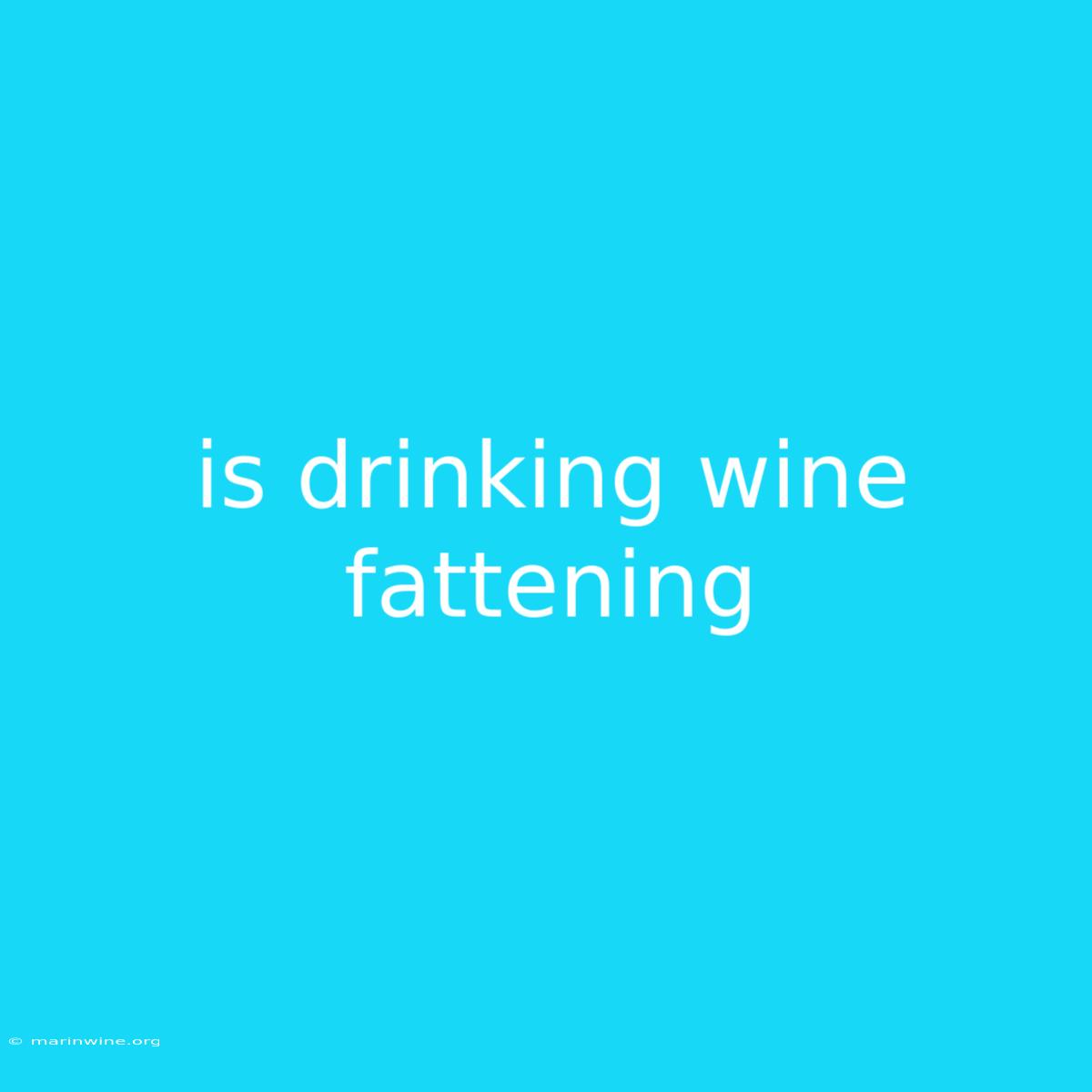Is Drinking Wine Fattening? Uncorking the Truth About Calories and Alcohol
Is drinking wine really fattening? This is a question that many wine enthusiasts ponder, especially those conscious of their weight. While it's true that alcohol contains calories, the answer isn't as simple as a straightforward "yes" or "no." Let's delve into the complexities of wine and weight gain, uncovering the truth behind this popular beverage.
Why It Matters
Understanding the relationship between wine and weight is crucial for those seeking a balanced lifestyle. Wine, a beloved beverage enjoyed for its flavor and social benefits, can impact weight management if consumed excessively or without mindful consideration. This article explores the key factors influencing wine's impact on weight and provides practical insights for informed consumption.
Key Takeaways
| Takeaway | Description |
|---|---|
| Wine Contains Calories | Alcohol is calorie-dense, contributing to overall energy intake. |
| Moderate Consumption Doesn't Necessarily Lead to Weight Gain | Enjoying wine in moderation as part of a balanced diet and active lifestyle is unlikely to significantly impact weight. |
| Excessive Consumption Can Contribute to Weight Gain | Consuming large amounts of wine can lead to excess calorie intake and contribute to weight gain. |
| Wine Can Affect Metabolism | Alcohol can disrupt metabolic processes and impact fat storage. |
Wine and Weight Gain: A Closer Look
Wine Calories
A standard 5-ounce glass of wine contains around 125 calories. This calorie count can vary depending on the type of wine, sweetness, and alcohol content.
Alcohol and Metabolism
Alcohol is metabolized differently than carbohydrates, fats, and proteins. The body prioritizes breaking down alcohol over other nutrients, which can disrupt metabolism and lead to increased fat storage.
The Impact of Excessive Consumption
When consumed in excess, wine can significantly contribute to weight gain. Excessive alcohol intake can:
- Increase appetite: Alcohol stimulates the release of ghrelin, a hormone that increases hunger.
- Decrease satiety: Alcohol can suppress the production of leptin, a hormone responsible for feeling full.
- Lead to unhealthy food choices: Alcohol can impair judgment and increase cravings for high-calorie, unhealthy foods.
The Role of Diet and Exercise
The impact of wine on weight is highly dependent on overall dietary habits and physical activity levels. A balanced diet and regular exercise can mitigate the potential for weight gain, even with moderate wine consumption.
Factors Affecting Wine and Weight Gain
Wine Type and Alcohol Content
Higher alcohol content in wines, such as fortified wines or dessert wines, generally translates to a higher calorie count.
Wine Serving Size
Larger serving sizes of wine can contribute to excess calorie intake, regardless of the wine type.
Frequency of Consumption
The frequency of wine consumption can also affect weight. Frequent and heavy alcohol consumption can lead to a surplus of calories.
Individual Metabolism
Individual metabolisms play a role in how the body processes alcohol and calories.
Diet and Exercise
Maintaining a healthy diet and regular exercise can help offset the potential impact of wine consumption on weight.
FAQ
Q: Does red wine help with weight loss?
A: Red wine contains resveratrol, an antioxidant with potential benefits for heart health. However, there's no definitive evidence that red wine directly promotes weight loss.
Q: Can I drink wine while on a diet?
A: You can incorporate wine into a healthy diet in moderation. However, it's crucial to monitor calorie intake and make informed choices about wine selection and portion sizes.
Q: Is it better to drink wine before or after a meal?
A: Consuming wine before a meal may increase appetite, while drinking it after a meal might contribute to slower digestion. Consider your individual tolerance and preferences.
Q: How much wine is considered moderate consumption?
A: Moderate wine consumption is generally defined as one drink per day for women and two drinks per day for men.
Tips for Enjoying Wine Mindfully
- Choose lighter wines: Opt for lower-calorie wines like dry whites, rosés, or light-bodied reds.
- Control portion sizes: Stick to standard serving sizes and avoid overpouring.
- Pair wine with healthy meals: Combine wine with balanced meals to enhance flavor and minimize calorie intake.
- Stay hydrated: Drink plenty of water throughout the day to stay hydrated and help with alcohol metabolism.
- Be mindful of your overall intake: Consider the frequency and quantity of alcohol consumption.
Summary of Wine and Weight Gain
While wine can be enjoyed as part of a healthy lifestyle, it's essential to be mindful of its calorie content and potential impact on weight. Excessive consumption can contribute to weight gain, while moderate intake, coupled with a balanced diet and regular exercise, is unlikely to significantly affect weight. By making informed choices about wine selection, serving sizes, and overall intake, individuals can enjoy the pleasures of wine without compromising their health and weight goals.

